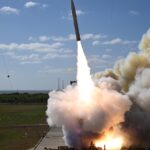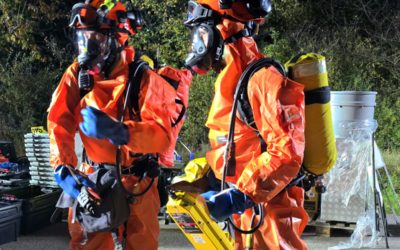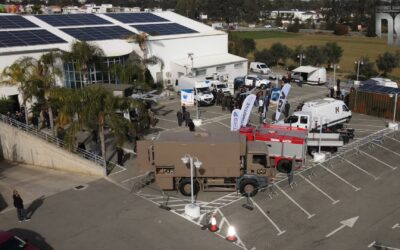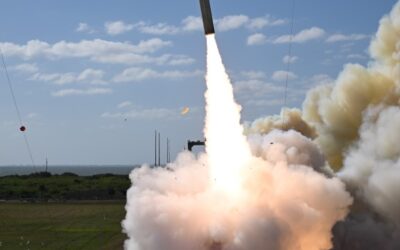The Republic of Cyprus and the United States, with satisfaction, reaffirm their joint commitment to strengthening Cyprus’ capabilities to…

The Japanese government plans to dump treated radioactive water from the damaged Fukushima nuclear power plant into the ocean, sparking concerns and backlash.
The head of the International Atomic Energy Agency (IAEA) Rafael Grossi, currently visiting Japan, met with residents of Fukushima in an attempt to reassure them about the Japanese government’s plans to dump treated radioactive water from the damaged nuclear power plant into the ocean.
The IAEA on Tuesday approved plans to dump into the ocean about 1.33 million tons of contaminated water stored at the Fukushima nuclear power plant, which was severely damaged after the March 11, 2011 earthquake and tsunami.
After a two-year review, the IAEA announced that Japan’s plans comply with international safety standards and will have a negligible radioactive impact on people and the environment.
During his visit to Iwaki, about 60 kilometers from the nuclear plant, Grossi admitted there are concerns. All these graphs and complex statistics are one thing, but the reality, the reality of people, the reality of the economy, the reality of social mood and perceptions may be different, he admitted before residents and local officials.
Also read: Turkey | Explosion at missile factory in Ankara due to chemical reaction
Water from Fukushima has been filtered to remove most radioactive elements except tritium, an isotope of hydrogen that is difficult to separate from water. Before being discharged into the Pacific, the treated waters will dilute, so that the levels of tritium they contain are far below the internationally approved ones.
Japan’s neighboring countries, such as China, oppose the plans, as do some residents of Fukushima, mainly fishermen who worry that consumers will not buy their products.
Tetsu Nozaki, president of the Fukushima Federation of Fishermen’s Unions, said the Japanese government misunderstands the view of society, which is completely opposed to the plans.
This, as certified by the IAEA, is a more general practice that is accepted and has been tested in many areas around the world, Grossi added, saying he has no magic wand to assuage residents’ concerns, but stressing that the organization will establish a permanent office in the region to oversee the process.
The Chinese authorities are to ban food imports from roughly a fifth of Japan’s prefectures for safety reasons, Chinese customs said today, following Tokyo’s decision to dump radioactive water from the damaged Fukushima nuclear power plant into the ocean.
China, the world’s largest buyer of seafood exported from Japan, will now also scrutinize documents accompanying food exported from the archipelago, mainly all fishery, the customs press release added.
It is emphasized that surveillance measures and detection of radioactive substances will be strengthened, in order to guarantee the safety of food imported from Japan. The purpose is to prevent any importation of food contaminated with radioactivity, the same source explained.
For weeks Beijing has voiced strong opposition to Tokyo’s decision to dump radioactive water from the Fukushima plant into the sea.
Also read: April 26, 1986 | The Chernobyl experiment leads to the biggest nuclear accident – VIDEO
READ MORE
Blackwolf Private Security Services | Tailored Solutions for top-notch security
In today’s world, security is essential, not optional and as such, Blackwolf Private Security Services Ltd., understanding the…
Hellenic Fire Brigade | Participation in the international exercise of full Launch of Detection / Sampling in a CBRN environment in Germany
Within the framework of the actions of the European Civil Protection Mechanism, specialised officers of the Fire Brigade of the team…
USA | The leader of the Islamic State was killed in an airstrike in Syria
The US military announced midday Friday that it had killed ISIS leader Abu Yusuf in an airstrike in Deir ez-Zor province.
THEON INTERNATIONAL | German parliament approves the exercise of the 3rd option of the OCCAR Night Vision contract
Theon International Plc (THEON) announces that the Defence and Budget Committees of the German Parliament approved yesterday a new…
BATTLEFIELD ReDEFiNED 2024 | The premier Defence and Security Conference Successfully Concludes in Cyprus – Photos
The International Defence and Security Conference “BATTLEFIELD ReDEFiNED 2024” was successfully concluded on Friday, 13, December 2024…
Dark Eagle | Successful Test of Hypersonic Missile by the US Army
The US Army has successfully conducted a test launch of its new hypersonic missile system, “Dark Eagle,” after two years of delays.
GCAP | Industry Partners Reached a Landmark Agreement to Deliver Next-Gen Combat Aircraft
BAE Systems (UK), Leonardo (Italy), and Japan Aircraft Industrial Enhancement Co Ltd (JAIEC) have reached an agreement to form a new…
Completion of the French-Hellenic Defence Innovation Symposium
On 12 and 13 December, 2024, the Hellenic Centre of Defence Innovation (HCDI) organised the first French-Hellenic Defence Innovation…






















